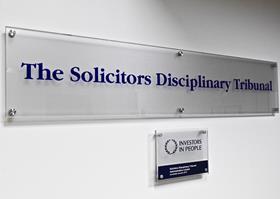Decisions filed recently with the Law Society (which may be subject to appeal)
Toslim Uddin Ahmed
Application 12570-2024
Admitted 1998
Hearing 10 September 2024
Reasons 23 October 2024
The SDT ordered that the respondent should be struck off the roll.

From around 1 November 2021 to 11 May 2022, the respondent had abandoned his sole practice, Universal Solicitors and, in doing so, had failed to progress client matters; to take appropriate steps to preserve and protect client confidentiality; or to notify clients and the Solicitors Regulation Authority of the firm’s closure. He had thereby breached paragraphs 4.2, 6.3 and 7.6 of the SRA Code of Conduct for Solicitors, RELs and RFLs, and principles 2, 5 and 7 of the SRA Principles 2019.
Between around 30 March 2022 and 30 June 2023, the respondent had failed to cooperate with the SRA’s investigation into his conduct by failing to respond to numerous attempts to contact him and requests for information, thereby breaching paragraphs 7.3 and 7.4 of the Code for Solicitors, and principle 2.
The SDT had received very little by way of information from the respondent and, without speculating, it was unable properly to assess the motivation for his conduct.
The impact of the respondent’s actions in abandoning client files and documents likely to contain confidential and privileged information, in an office that was due to be relet, was considerable. The respondent’s conduct demonstrated a lack of care for anyone affected by the closure, principally his clients who were seemingly ‘left high and dry’.
As a result of the respondent’s misconduct, the landlord had to contact the regulator, and the regulator had expended considerable effort attempting to contact the respondent. The harm caused by the respondent’s misconduct was therefore not limited to the firm’s clients.
Given the serious nature of the misconduct which had been found proved, including failing to progress the cases of hundreds of clients, failing to protect clients’ confidentiality and failing to demonstrate any form of accountability to the regulator, the SDT had considered and rejected the lesser sanctions available to it.
The protection of the public and the protection of the reputation of the legal profession required nothing less than the respondent’s removal from the profession and the SDT ordered that he be struck off the roll.
The respondent was ordered to pay costs of £21,000.
Mark Robert Westwood
Application 12610-2024
Admitted 1985
Hearing 3 October 2024
Reasons 25 October 2024
The SDT ordered that the respondent should pay a fine of £12,500.
While in practice as a solicitor at Cavendish Legal Group/O’Neill Patient Solicitors, the respondent had acted in five conveyancing transactions where there was a conflict of interest or significant risk of an own interest conflict between his lender client and himself. In doing so he had breached principles 4, 5 and 6 of the SRA Principles 2011, and had failed to achieve outcome 3.4 of the SRA Code of Conduct 2011; and had breached principles 2 and 7 of the SRA Principles 2019, and paragraphs 3.2 and 6.1 of the SRA Code of Conduct for Solicitors, RELs and RFLs 2019.
In five conveyancing transactions, he had failed to disclose to his lender client material information concerning his relationship to his borrower client (the borrower client being either an immediate relative or himself), thereby breaching principles 2, 4, 5 and 6 of the 2011 Principles, and failing to achieve outcome 4.2 of the Code of Conduct; and breaching principles 2, 5 and 7 of the 2019 Principles, and paragraphs 3.2 and 6.4 of the Code of Solicitors.
The parties had invited the SDT to deal with the allegations against the respondent in accordance with a statement of agreed facts and outcome.
The SDT had reviewed all the material before it and was satisfied on the balance of probabilities that the respondent’s admissions had been properly made.
The respondent had erred significantly in acting in conveyancing transactions where there were conflicts of interest, with the consequential risk of harm to clients and lenders being an evident danger.
There had been no dishonesty on the respondent’s part and he had demonstrated genuine remorse and insight into his failings, which had included open and frank admissions and full cooperation with his regulator. Considerable steps had been taken by the respondent to address the mistakes he had made.
In all the circumstances of the case, it was proportionate and in the public interest that the respondent should be fined £12,500.
The respondent was ordered to pay costs of £19,670.






























